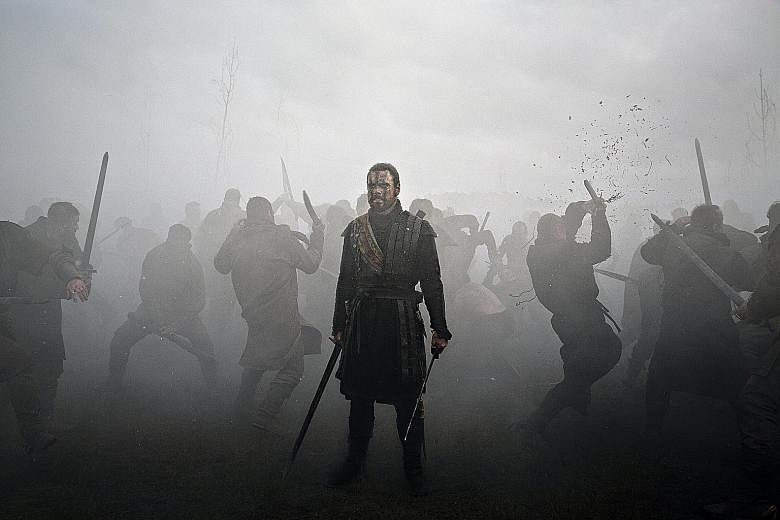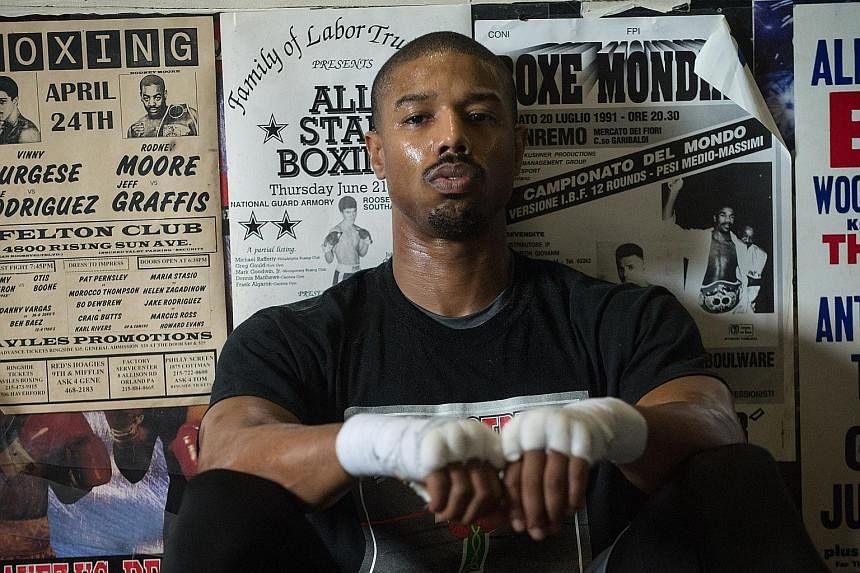Two stories about men growing into greatness - one is written as a tragedy, the other as a testimony to the power of believing in yourself. Can you guess which one is British and which is American?
In Macbeth (NC16, 113 minutes, opens tomorrow, 3.5/5 stars), a Scottish general stabs his way to a throne because of a prophecy, then finds that forecasts from witches come with rolls of fine print.
Leave to others ideas about setting Shakespeare's plays in non-traditional places and periods. Australian director Justin Kurzel goes back to the source. He gets mediaeval on you: The world of Macbeth is frontierland, a wild place cloaked in fog, mud and grass. Everything looks lived-in and worn out.
Previous film adaptations, most famously by Roman Polanski in 1971, play up the pomp and colour; Kurzel mutes colour so much the film looks near-monochrome.
There are no shots of castles with spires gleaming and flags fluttering. Buildings are dark and squat, with the royal chambers as bare as monasteries.
The action takes place mostly outdoors. While you feel sorry for everyone standing exposed to what looks like freezing weather, each frame, composed with the deliberation of a Zen garden, is beautiful.
Even the slaughter is exquisite. Most adaptations open with the witches that appear after the battle. Kurzel opts to open the film with armies going at each other and the carnage is intimate and ferocious.
Plenty of authenticity comes by way of speech. Forget everything you know about traditional Bard enunciation. The emphasis here is on naturalism rather than the beauty of the verse.
Michael Fassbender's Macbeth mumbles or hisses through clenched teeth, while French actress Marion Cotillard's accent makes her Lady Macbeth frustrating to follow, even as her tone soothes the ear. Both walk through the film looking haunted rather than hungry; the death of their child and war have sapped them of tenderness.
Kurzel's decision to go primal pays off mostly in how gorgeously severe the film looks, a benefit augmented by the stoicism Fassbender and Cotillard give their characters. But other than the primitivist design, little else has been done that gives new insight into one of Shakespeare's most famous tragedies.
Don't let the title Creed(PG13, 133 minutes, opens tomorrow, 2.5/5 stars) fool you; this should be named Creed And Rocky, so much does this feature the character from the series that originated the character of the working-class hero from Philadelphia.
Coming nearly 40 years after the release of Rocky (1976) and almost a decade after the last instalment (Rocky Balboa, 2006), the franchise has for the first time given up the idea of making Rocky, or more accurately, actor Sylvester Stallone, go toe-to-toe with another fighter. Sanity has prevailed.
Instead, the ageing man trains Adonis Creed (Michael B. Jordan), the son of foe-turned-buddy Apollo Creed (Carl Weathers, seen in flashback).
Just in case anyone thinks that Hollywood has a liberal bias, since film two (Rocky II, 1979), the franchise has become a cartoon about losing then winning back male honour, from a mouthy black man (Clubber Lang, played by Mr T, in 1982's Rocky III), or a Cold War proxy (Ivan Drago, 1985's Rocky IV).
A foreigner, this time Englishman Ricky Conlan (played by professional boxer Tommy Bellow) threatens American dominance.
Director and co-screenwriter Ryan Coogler (Fruitvale Station, 2013) updates the manhood- regained template by giving Adonis a cool DJ-musician love interest Bianca (Tessa Thompson), but doesn't forget to throw in plenty of in-series references in Philadelphia landmarks and theme music.
Coogler takes the franchise away from cartoon and into family drama. Much time is spent on Adonis' angst and the predictable father-son bond that develops between boxer and trainer, ignoring how the magic of Rocky relies on a memorable villain. Conlan, the Liverpudlian lout, is a footnote.
This is old Rocky in a new bottle; Coogler's updates don't go far enough to hide how, like Rocky, the franchise should have walked out of the ring with some dignity remaining.



